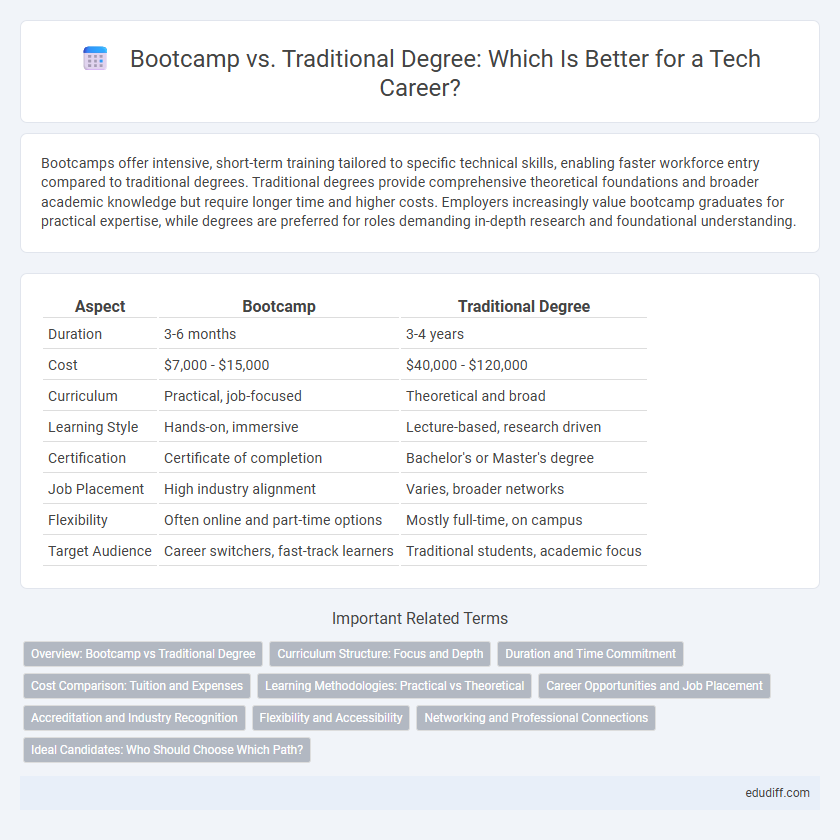Bootcamps offer intensive, short-term training tailored to specific technical skills, enabling faster workforce entry compared to traditional degrees. Traditional degrees provide comprehensive theoretical foundations and broader academic knowledge but require longer time and higher costs. Employers increasingly value bootcamp graduates for practical expertise, while degrees are preferred for roles demanding in-depth research and foundational understanding.
Table of Comparison
| Aspect | Bootcamp | Traditional Degree |
|---|---|---|
| Duration | 3-6 months | 3-4 years |
| Cost | $7,000 - $15,000 | $40,000 - $120,000 |
| Curriculum | Practical, job-focused | Theoretical and broad |
| Learning Style | Hands-on, immersive | Lecture-based, research driven |
| Certification | Certificate of completion | Bachelor's or Master's degree |
| Job Placement | High industry alignment | Varies, broader networks |
| Flexibility | Often online and part-time options | Mostly full-time, on campus |
| Target Audience | Career switchers, fast-track learners | Traditional students, academic focus |
Overview: Bootcamp vs Traditional Degree
Bootcamps offer intensive, short-term training focused on practical skills in technology fields, ideal for rapid career shifts, while traditional degrees provide comprehensive, theory-based education typically spanning several years. Bootcamps emphasize coding languages, software development, and hands-on projects to quickly prepare students for industry demands, whereas degrees cover broader academic foundations including mathematics, algorithms, and computer science principles. Employers increasingly recognize bootcamp graduates for their job-ready abilities, but traditional degrees remain valued for in-depth knowledge and long-term career growth in technical disciplines.
Curriculum Structure: Focus and Depth
Bootcamps offer a highly focused curriculum emphasizing practical skills and coding proficiency within a condensed timeframe, often lasting a few months. Traditional degrees provide a comprehensive curriculum covering theoretical foundations, broad computer science topics, and elective courses over several years. The depth in degrees facilitates a strong conceptual understanding, while bootcamps prioritize immediate job readiness through hands-on projects and real-world applications.
Duration and Time Commitment
Bootcamps typically offer intensive, short-term programs lasting 8 to 12 weeks, designed to deliver practical skills in a condensed timeframe. Traditional degrees require a multi-year commitment, often spanning 3 to 4 years for undergraduate studies, with a structured curriculum covering a broad range of theoretical and practical subjects. The time commitment for bootcamps is usually full-time or immersive, whereas traditional degrees may offer part-time or flexible schedules accommodating longer-term academic engagement.
Cost Comparison: Tuition and Expenses
Bootcamp tuition typically ranges from $7,000 to $15,000, significantly lower than traditional degrees, which can cost between $40,000 and $120,000 for a four-year program. Additional expenses for traditional degrees include room, board, and textbooks, often totaling $20,000 to $30,000 annually. Bootcamps offer condensed, skill-focused training with fewer ancillary costs, making them a cost-effective alternative for career pivoting in technology fields.
Learning Methodologies: Practical vs Theoretical
Bootcamps emphasize hands-on, project-based learning to quickly develop practical skills applicable to real-world scenarios, whereas traditional degrees focus on theoretical foundations and comprehensive academic knowledge. Bootcamp curricula are often condensed and aligned with current industry demands, enabling rapid skill acquisition through immersive coding exercises and collaborative tasks. Traditional degree programs incorporate extensive lectures, research, and exams to build deep conceptual understanding but may lack immediate practical application.
Career Opportunities and Job Placement
Bootcamps offer accelerated, skills-focused training aligned with current industry demands, leading to faster job placement in tech roles such as software development, data analysis, and cybersecurity. Traditional degrees provide a comprehensive theoretical foundation and broader career opportunities across diverse fields but may require longer time and higher costs before entering the job market. Employers increasingly value bootcamp graduates for their practical experience and project portfolios, especially in rapidly evolving tech sectors.
Accreditation and Industry Recognition
Bootcamps offer practical, skill-focused training but often lack formal accreditation compared to traditional degrees from accredited universities recognized by organizations like ABET or regional accrediting bodies. Traditional degrees provide a structured curriculum vetted for academic rigor, enhancing credibility with employers and eligibility for certifications that require accredited education. Industry recognition of bootcamp credentials varies, with some tech companies prioritizing demonstrable skills and portfolio, while others still prefer candidates with accredited degrees for roles that demand formal qualifications.
Flexibility and Accessibility
Bootcamps offer flexible schedules with options for part-time, evening, and online classes, making education accessible to working professionals and learners worldwide. Traditional degrees often require full-time attendance and campus presence, limiting accessibility for those with other commitments or geographic constraints. This flexibility in bootcamps accelerates skill acquisition tailored for rapidly evolving tech industries, whereas traditional degrees follow fixed academic calendars.
Networking and Professional Connections
Bootcamp programs in networking emphasize hands-on experience and industry-specific skills, enabling rapid entry into technical roles while fostering direct connections with IT professionals and employers. Traditional degrees offer a broader theoretical foundation and long-term academic networking opportunities through alumni associations and campus events, though they require extended time and financial investment. Networking bootcamps often provide immediate exposure to current industry tools and direct mentorship, accelerating professional relationship building in the tech sector.
Ideal Candidates: Who Should Choose Which Path?
Ideal candidates for coding bootcamps are career changers and self-motivated learners seeking rapid, practical skills in software development without the time or financial commitment of a traditional degree. Traditional degrees suit students pursuing comprehensive theoretical foundations and long-term career goals in fields like computer science or engineering, where formal accreditation and in-depth knowledge are valued. Employers often look for bootcamp graduates for entry-level technical roles requiring hands-on coding proficiency, while degrees are preferred for research, advanced development, or leadership positions.
Bootcamp vs Traditional Degree Infographic

 edudiff.com
edudiff.com